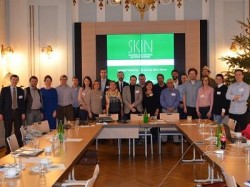Discovering inspiring short food supply chains practices from Austria
On the 18th and 19th of January, the consortium had the opportunity to do this while assessing the main drivers for change within the sector during their workshop in Vienna. Discussions took place on population growth, food security and technology, and consumer habits. At the beginning of the workshop, Hanni Rützler of Future Food Studio took the centre stage by strengthening the connection between food, health and everyday habits by assessing consumer and societal trends. Later on, a series of innovative Viennese practices were presented during the workshop. Wolfgang Palme of Cityfam introduced the major factors related to the development of modern agriculture in urban areas. These include the tight link between local products, the direct selling approach, and the rapidly surging community gardening and urban gardening initiatives. These are good ways to bring citizens and communities closer to the food they consume. An innovative case about the way the reduction of waste can lead to the production of taste was then presented. Manuel Bornbaum of Hutundstiel grows mushrooms out of organic urban waste and sells them to local restaurants. Another innovative initiative can be found in a restaurant called Radius 66. Led by Josef Floh, it serves only seasonal and local products, which offer a tasteful experience of the region. They come from local providers who are located within the restaurant’s 66 km radius. Lastly, the SKIN consortium met Gregor Hoffman of Bluen who conciliates zero-waste production agriculture with sustainable fish production, thus establishing a circular and sustainable link between water and agriculture. After meeting the key players from Austria, a field trip took place to discover the short food supply chains activities happening at the Agricultural Technical School of Pyhra. Here, the students get practical training and lessons on plant production, animal husbandry, forestry, farm machinery, fruit growing, dairy production and processing, concluding the trip of Austrian good practices discovery. Beyond these practical cases, the SKIN partners were taken through a series of scenarios shaped by the emergence of innovative technologies in the food sector and by our evolving food experience and consumption habits. In the grander scheme of things, these good practices are indeed insightful and innovative examples that capture the relevance of short food supply chains with the sustainable perception on food production and consumption.
Countries
Austria



